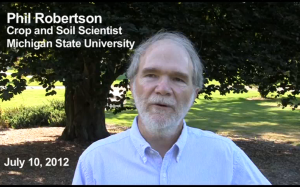
Screenshot from Yale Forum on Climate Change and the Media.
The increasing unpredictability of extreme weather makes it hard to adapt U.S. crops to climate change.
So says, Phil Robertson, a crop and soil scientist from Michigan State University, in a recent video released by the Yale Forum on Climate Change and the Media.
Adjusting planting strategies and adapting new crop genetics are straightforward approaches farmers and crop scientists can take to respond to new climate conditions, he said.
The variability of extreme weather complicates these tactics, though.
“Extreme events, with the longer heat waves, with seasonal droughts, which are much more difficult to predict, and much more important in their effects on crops will be, I think, probably the hardest aspect of climate change to anticipate and adapt to,” Robertson said in the video.
To illustrate the climate changes farmers may have to adjust to, the video uses predictions from “Global Climate Change Impacts in the United States,” a report put together by the U.S. Global Change Research Program.
The report predicts that Illinois, “the heart of the grain belt” in the U.S., will have growing conditions similar to south Texas by the end of the century.
